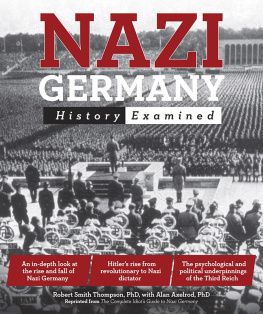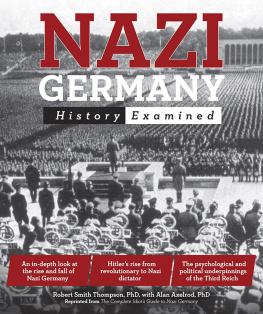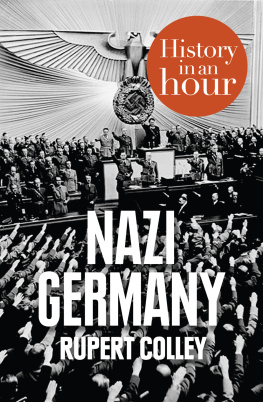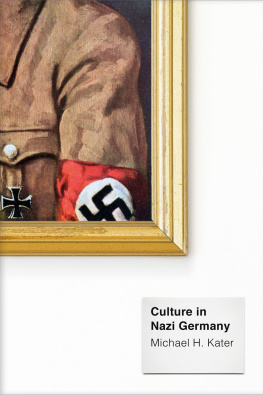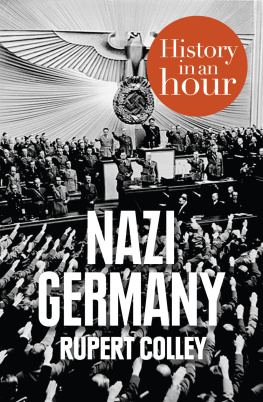Unknown Secrets of Nazi Germany
Unique modern and old world war technology
Dick W. Kerry
William S. Carson
All rights reserved
Dick W. Kerry, William S. Carson 2017
PBS Astreul, Kiev, Ukraine, 2018
None of the parts of this book cannot be copied without the consent of the author or the right holders
Design by Fred Burgess
Fotos by:
Jim Thorston
Daniel Smith
Gina Smith
Tanya Dolski
Sam Sanderson
Chris Parkinson
This book is devoted to secrets and ambiguous facts in the history of Nazi Germany and, especially, to people who are associated with them.
This collection is compiled from previous books, and also includes new articles on missiles and jet engines.
In the history of Nazi Germany there are many unsolved mysteries. Those who are fond of the history of World War II are interested in such riddles of the Third Reich as the construction of dungeons and secret bases, the development of the submarine fleet and submarines and also the fate of gold and museum valuables of Hitler's Germany.
The book "The Black Secrets of Nazi Germany" is a collection of essays and articles that will be able to provide answers to some of these mysteries.
Content:
Unfortunately, English is not the author's native language. All errors and inaccuracies in the book remain on his conscience.
Karl Dnitz. Father of the German Kriegsmarine

Karl Dnitz was born on September 16, 1891 in Grnau near Berlin and was the second and last child of the optician engineer Emil Dnitz, who worked in the famous firm of Karl Zeiss in Jena. The children were left without mother early. Emil Dnitz understood that only a good education would provide his sons with a decent future. Karl studied first at the Zerbst gymnasium, and then at a real school in Jena. On April 1, 1910, young Dnitz began training at the naval school in Kiel.
While still a cadet, Dnitz was an industrious and withdrawn young man who considered "devotion to duty as the main moral value." During his studies he was not particularly distinguished and did not enjoy the respect of his comrades. In 1912 he was transferred to the naval school in Murvik, and then, to complete the training, he was appointed watch officer for the light cruiser Breslau. In the autumn of 1913, Dnitz was promoted to the lieutenants of the zur zeye. During the Balkan crisis, Breslau participated in the international blockade of Montenegro.
The beginning of the First World War found "Breslau" in the Mediterranean Sea. He managed to escape from the British to Turkey, where the cruiser joined the fleet of the Ottoman Empire and fought in the Black Sea against the Russians. During one of the raids "Breslau" broke into the harbor of Novorossiysk, sank all the ships there and destroyed the oil storage.
In July 1915, at the entrance to the Bosporus Strait, Breslau was blown up by a Russian mine. While the cruiser was repaired, Dnitz settled in the Air Force and took part in the fighting at Gallipoli as an arrow and a manat. In February 1916, he was promoted to the Ober-lieutenants of the zurye, and in the summer he was recalled to Germany and sent to retrain to an officer of the submarine fleet, on whom high hopes were placed.
From October 1, 1916 to January 1917, Dnitz went through the necessary training and continued his service in the Adriatic, at U-39, commanded by Lieutenant-Captain Walter Folstman, as a torpedo officer. Here Karl Dnitz acquired the necessary practical skills. He proved himself well, was summoned to Kiel, completed courses there for submarine commanders, and in January 1918 received a UC-25 displacement of 417 tons, which was both a mine guard and a torpedo submarine. Dnitz was ordered to act in the Mediterranean.
By the time Dnitz brought the boat to the first patrol, it was clear that the German total underwater war did not meet expectations and was defeated, as the British developed a reliable system of convoys and possessed powerful deep-sea bombs. Nevertheless, Dnitz excelled. First he sank the steamer, and then boldly penetrated the internal raid of the Sicilian port of Augusta and sank a 5,000-ton Italian coal miner, who took over the English floating shipyard "Cyclops." Even though, returning to the base, Dnitz landed the boat on the bank; Kaiser awarded him the Order of the Hohenzollern House. To the great shame of Karl Dnitz, he was stripped off by an Austrian destroyer.
UC-25 repaired in July, and Dnitz again brought her into the sea. He landed mines in the area of Cape Corfu and torpedoed 4 ships. One jumped ashore, while others, apparently, drowned. Dnitz did not have time to follow them, because he could destroy a strong escort. This trip was a great achievement, especially considering that the obsolete UC-25 could carry only 5 torpedoes. As a reward, Dnitz received a more high-speed and larger UB-68 submarine. Unfortunately, the crew was inexperienced, and the boat was unstable when submerged.
On October 4, 1918, Dnitz attacked a British convoy, sank the vehicle "Upek" (3883 tons) and ordered to sink. The inexperienced mechanic was confused, and the submarine, taking a dangerous trim, went to the bottom with a stone. Fearing that the huge pressure would crush the hull, Dnitz ordered to blow the tanks, give full speed and put the rudders in a horizontal position. The boat stopped at a depth of 102 meters - 32 meters below the maximum permissible limit of immersion. Tanks with compressed air were cracked, and the submarine, which lost control, was thrown to the surface of the sea.
Looking out of the hatch, Denis found that he was in the center of the British convoy, and the destroyers that were spewing fire were flying toward him at full speed. He quickly closed the hatch and ordered to dive, but the compressed air ran out, and it was impossible to do. As the shells lay down a few meters from the boat's hull, Dnitz ordered the crew to leave it. The mechanic opened the kingstones to flood the submarine, but hesitated and flew with her into the sea. The picture of his death pursued Dnitz for the rest of his life. In addition to the mechanic, two more people drowned. The rest were picked up by the British.
Dnitz came to the camp for officers in Redmyer near Sheffield. His chances of getting a job in his homeland by profession would have been more if he had repatriated before thousands of other officers. For this, Dnitz feigned madness. According to the testimony of Wolfgang Frank, he, like a child, played with empty cans and small porcelain dogs, while even the camp authorities did not find him crazy. Many years later, his former comrades in the camp were indignant when Dnitz, whom they remembered as abnormal, occupied the highest posts in the Kriegsmarine. Karl Dnitz instantly recovered from his "illness" in July 1919, as soon as he returned to Germany.
Career advancement
In 1919, many young naval officers were clear that there are more important concerns than to revive the inglorious monarchy. Dnitz, as he himself admitted, was a monarchist both in his conviction and in his upbringing. Theoretically, he also later recognized the monarchy as the most ideal form of state structure, and Hitler's sarcastic statement that the army is Christian, the Air Force is National Socialist, and the Navy is Kaiser, and also refers to Dnitz. But Dnitz continued to serve not therefore. The people and homeland for such officers as Dnitz were above all. He continued his service at the military base in Kiel, but at heart he yearned to return to the submarine fleet, which was to be reborn, despite the fact that the Treaty of Versailles forbade Germany to have it.
In 1920, Dnitz transferred to torpedo boats and became commander of the T-157 at the base of Swinemnde on the coast of Pomerania. In the beginning of 1921 he became a lieutenant-captain, and in 1923 returned to Kiel, as an expert of the mine and torpedo-reconnaissance inspection and participated in the development of a new model of a deep-sea bomb. In the autumn of 1924, after short courses of staff officers, led by Raeder, Dnitz was transferred to the naval command in Berlin. Here he participated in the development of a new naval statute and provisions on military crimes and fought the penetration of Bolshevism into the fleet. Dnitz, in the nature of his work, was forced to maintain constant contact with the Reichstag, which turned him into an aversion to politics.
Next page



